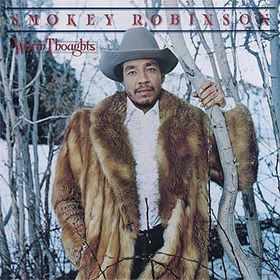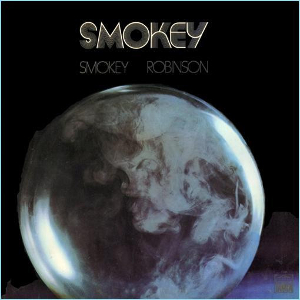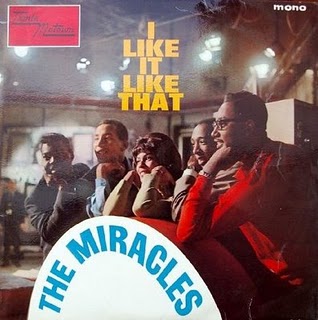
Diana & Marvin is a duets album by American soul musicians Diana Ross and Marvin Gaye, released October 26, 1973 on Motown. Recording sessions for the album took place between 1971 and 1973 at Motown Recording Studios in Hollywood, California. Gaye and Ross were widely recognized at the time as two of the top pop music performers.

Warm Thoughts is an album by the American musician Smokey Robinson, released in 1980. It features the top 40 hit, "Let Me Be the Clock". The album was arranged by Reginald "Sonny" Burke. This album also featured the semi-autobiographical tune "Wine, Women and Song", which proved to be the closest thing to a Miracles reunion that occurred in the 1980s, with Smokey doing a duet with his then-wife, former Miracle Claudette Robinson, and Miracle Marv Tarplin, with whom he shared songwriting credits, on guitar. The song "Travelin' Thru'" was written by Smokey's real-life sister, Rose Ella Jones, and two songs written by Robinson with fellow Motown artist, Stevie Wonder, and singer, songwriter, and former Starsky and Hutch star, David Soul. This album was a success, reaching the Top 20 of The Billboard 200 Pop Album chart, peaking at No. 14, and the Top 10 of Billboard's R&B Album Chart, peaking at No. 4.

A Quiet Storm is the 1975 third solo album by American soul singer, songwriter, and producer Smokey Robinson. The album received generally positive reviews, and spawned the hit single "Baby That's Backatcha", which spent one week at the top of the Billboard Hot Soul Singles chart.

Smokey is the debut studio album by American soul singer, songwriter, and producer Smokey Robinson. It was released on June 19, 1973, by Tamla Records and was Robinson's first solo record after his departure from The Miracles. The album featured the single "Sweet Harmony", which was his tribute to his former singing partners in the Miracles: Bobby Rogers, Pete Moore and Ronnie White. Smokey was arranged by Dave Blumberg, Gene Page and Willie Hutch. It also featured the song "Baby Come Close", his first solo hit single, and the single "Just My Soul Responding", a protest song dealing with ghetto life in America, and the plight of the American Indian. Smokey peaked at number 70 on the Billboard albums chart, on which it spent 19 weeks.

The Way I Am is the fourteenth studio album by Billy Preston, released in 1981. The album was arranged by Bob Esty, David Blumberg, Arthur G. Wright, Marty Paich, Gene Page and Billy Preston.

Big Time is a Smokey Robinson soundtrack album released on June 28, 1977. It was arranged by Ronnie McNeir and Sonny Burke with Melvin "Wah Wah" Watson credited for guitar.

Love Breeze is an album by the American musician Smokey Robinson, released in 1978. It was arranged by Sonny Burke. It peaked at No. 75 on the Billboard 200.

Smokin' is a Smokey Robinson live album released in 1978.

Where There's Smoke... is a 1979 album by Smokey Robinson, released on Motown Records' Tamla label. It contains his Billboard Top ten pop hit single "Cruisin'".

Make It Happen is a 1967 album by Smokey Robinson & the Miracles. It featured ballads such as the hit singles "The Love I Saw in You Was Just a Mirage" and "More Love", as well as the up-tempo "The Tears of a Clown" co-written by Stevie Wonder and his producer Hank Cosby.

Greatest Hits, Vol. 2 is the second greatest hits album for The Miracles, released in 1968 on Motown Records' Tamla label. It contained the most popular singles from the successful Going to a Go-Go, Away We A Go-Go and Make It Happen albums of the 1965–1967 period. It also featured the 1964 non-album single "Come On Do The Jerk", and two B-sides, "Choosey Beggar" and "Save Me". The hit single "I Second That Emotion" was new to the album. This album reached the Top 10 on the Billboard 200 albums chart, peaking at #7, and peaked at #2 on Billboard's R&B album chart. Ten of the albums' 12 songs were written by Miracles members Smokey Robinson, Pete Moore, Marv Tarplin, Bobby Rogers, and Ronnie White.

Time Out for Smokey Robinson & the Miracles is a 1969 album by Motown group The Miracles. It reached #25 on the Billboard Pop Album chart, and contains four pop top 40 singles – "Doggone Right", "Abraham, Martin & John", "Here I Go Again" and the top ten pop smash hit "Baby, Baby Don't Cry". Time Out also features covers of Motown songs such as "For Once in My Life" and the Robinson-penned songs "My Girl" and "The Composer". Miracles members Marv Tarplin, Pete Moore and Ronnie White were also co-writers on several of the album's tracks, along with Motown staff songwriters Al Cleveland, Ron Miller and Terry Johnson. Miracle Pete Moore also co-produced two of the album's tracks, a prelude to his later production of the Miracles' massively successful platinum-selling City of Angels album of a few years later. The Miracles' Time Out album was originally released on CD in 1986, and again in 2001 coupled with their album, Four in Blue.

Marvin Tarplin was an American musician, best known as the guitarist for the Miracles from the 1950s through the early 1970s. He was one of the group's original members and co-wrote several of their biggest hits, including the 1965 Grammy Hall Of Fame-inducted "The Tracks of My Tears". He is also a winner of the BMI Songwriter's Award, and the ASCAP Award Of Merit, and was a 2012 posthumous inductee into the Rock and Roll Hall of Fame with the Miracles.

Flying High Together is an album by Smokey Robinson and the Miracles on Motown Records' Tamla label, released in 1972. It is noted as The Miracles' last studio album with original lead singer Smokey Robinson, who retired from the act to concentrate on his duties as vice president of Motown. The album charted at #46 on the Billboard Pop Album chart, and featured two singles: the appropriately named "We've Come Too Far to End It Now", which matched the parent album's chart position on the Billboard singles chart, charting at #46, and reached the Top 10 of the Billboard R&B singles chart, charting at #9, and "I Can't Stand to See You Cry", which charted at #45 Pop, and #21 R&B.

What Love Has...Joined Together is a 1970 album by R&B group Smokey Robinson & The Miracles on Motown Records' Tamla label. A concept album consisting solely of six short love songs, it charted at number 97 on the Billboard Top 200 Album chart, and reached the Top 10 of Billboard's R&B album chart, peaking at number 9. It was the first Miracles album to have no new songs; the recordings are all cover versions of songs written by noted composers, such as Stevie Wonder, Berry Gordy, Frank Wilson, Brenda Holloway and her sister Patrice Holloway, Burt Bacharach and Hal David, Marvin Gaye, The Beatles' John Lennon & Paul McCartney,, and Miracles members Smokey Robinson and Bobby Rogers.

I Like It Like That is an album by Motown group the Miracles, compiled for the UK market and released on the UK Tamla-Motown label as one of its initial group of six albums in March 1965. There was no equivalent album to this in the USA. It is known as the Miracles' "forgotten album".

Touch the Sky is a 1983 album by American singer Smokey Robinson. It was produced and arranged by Robinson with Reginald "Sonny" Burke, and recorded and mixed at Golden Sound Studios, Inc., Hollywood, California. The album was released on the Motown sub-label Tamla.

Essar is a 1984 album by American singer Smokey Robinson. It was produced and arranged by Robinson with Reginald "Sonny" Burke. The album was released on the Motown sub-label Tamla. The album's title is a pun on the initials of Robinson's name (S.R.).

My World (The Definitive Collection) is a 2005 greatest hits compilation from American soul music singer Smokey Robinson, sometimes featuring his earlier group The Miracles. It has received positive reviews from critics. The compilation was produced by William "Mickey" Stevenson and Harry Weinger and features two new tracks. The original recordings were digitally remastered by Ellen Fitton at Universal Mastering Studios-East.

Martha Reeves is the debut album by singer Martha Reeves, released in 1974 on the MCA label. It is her first album after her position as lead singer in Martha and the Vandellas, who disbanded two years before the album's release. The album peaked at No. 94 in Australia.




















